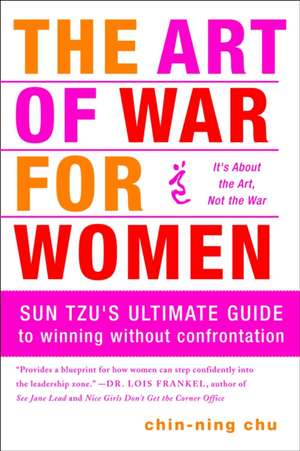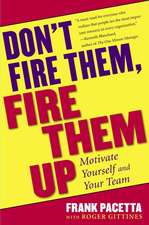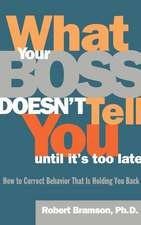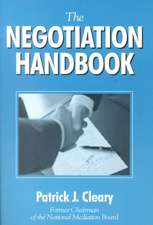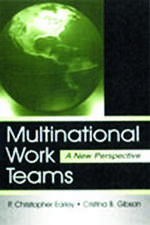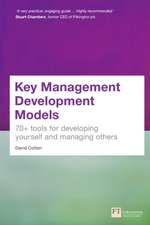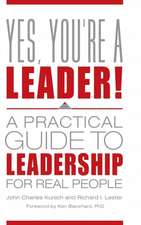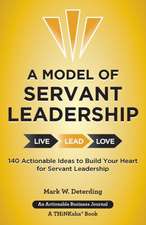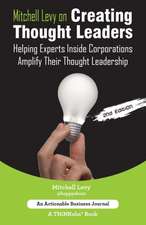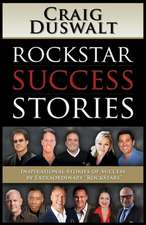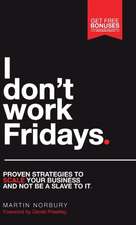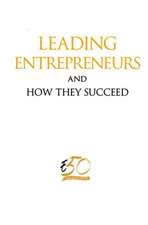The Art of War for Women: Sun Tzu's Ultimate Guide to Winning Without Confrontation
Autor Chin-Ning Chuen Limba Engleză Paperback – 31 ian 2010
Would you like to transform your weaknesses into strengths? Succeed at work without compromising your ethics? Integrate your style and personal philosophy into every action you take? If so, this book is for you. In The Art of War for Women, bestselling author Chin-Ning Chu brings the eternal wisdom of philosopher-general Sun Tzu to women looking to gain a better understanding of who they are – and, more importantly, who they want to be.
In the West, when we think of war, we imagine battle, casualties, brutality. But Sun Tzu, the man who wrote the Art of War some 2,500 years ago, was Chinese, and the Chinese think of war differently than we do in the West. In their view, war does not revolve around fighting. It is about determining the most efficient way of gaining victory with the least amount of conflict.
That’s why Sun Tzu’s Art of War is particularly appropriate for women. Let’s face it, as intelligent and accomplished as we may be, there are very few of us who are comfortable with direct confrontation or situations where our triumph means someone else’s defeat. We are natural negotiators and problem solvers; most of us prefer win-win situations to those in which winner-takes-all.
But there is another reason The Art of War is particularly appropriate for us. Although Sun Tzu’s book is about the application of strategies, every one of those strategies begins with having a deep understanding of the people and the world around us. They also require us to understand ourselves – our strengths and weaknesses, our goals and fears. In other words, the aim is not to apply a series of rules coldly and dispassionately, but rather to integrate ourselves and our unique talents into the strategies we will employ.
This is not a feel-good book. (But you will feel good after reading it.) It is not a motivational book. (But you will be motivated to achieve what you want, once you are done.) Ultimately, its purpose it to provide women with the strategies we all need to overcome the obstacles that stand in the way of our goals and dreams.
Sun Tzu’s Art of War is the most influential book on strategy ever published, selling tens of millions of copies worldwide in several editions. Written by one of today’s foremost authorities on Sun Tzu, The Art of War for Women is sure to become a classic in its own right.
Preț: 88.86 lei
Nou
Puncte Express: 133
Preț estimativ în valută:
17.00€ • 17.80$ • 14.15£
17.00€ • 17.80$ • 14.15£
Carte disponibilă
Livrare economică 10-24 martie
Preluare comenzi: 021 569.72.76
Specificații
ISBN-13: 9780385518437
ISBN-10: 0385518439
Pagini: 211
Dimensiuni: 127 x 188 x 20 mm
Greutate: 0.18 kg
Editura: Broadway Business
ISBN-10: 0385518439
Pagini: 211
Dimensiuni: 127 x 188 x 20 mm
Greutate: 0.18 kg
Editura: Broadway Business
Notă biografică
CHIN-NING CHU, an internationally renowned speaker and the bestselling author of Thick Face, Black Heart, is a descendant of Chu Yuan-Zhang, the pauper who became the first Emperor of the Ming Dynasty by defeating the descendant of Genghis Khan. The president of Asian Marketing Consultants, Inc., chairperson of the Strategic Learning Institute, and president of Neuroscience Industries, Inc., she was a major contributor to the Discovery Television Great Book series on The Art of War.
Extras
CHAPTER 1
Ji (Planning)
The Elements of Strategy
Before waging a war, the five elements that govern success must be examined. Only then can a proper assessment be done.
Those five elements are: 1. Tao (moral standing or ethics); 2. Tien (timing); 3. Di (terrain or resources); 4. Jiang (leadership); 5. Fa (managing).
The first chapter of Sun Tzu’s Art of War contains the core message of the book and includes all the principles that will be discussed in the remaining twelve chapters. Sun Tzu begins this chapter with a discussion of a concept called “Ji.” (*) Ji has a broad range of meanings: plotting and planning, predicting, comparing, and analyzing. All these elements are part of “prewar” strategy—in other words, they’re the steps you must take before you take any action.
Once you can understand these planning stages of life, the rest of Master Sun’s strategies will become second nature. For this reason, I examine his first chapter in depth. According to Sun, five elements govern success and must be understood in the planning stages of any action.
TAO: Your moral standing and the motivation that drives your actions. If your moral position is pure, colleagues will be willing to go to the mat for your cause.
TIEN: Timing. There are certain times when you should take action, other times when it is far better to wait. Tien lets you know which way to decide.
DI: “Earth,” “terrain,” or “resources.” Di refers to the obstacles that you face on your journey to success. Are you traveling over level ground? In other words, is everything going smoothly at work—or is each task akin to scaling a great mountain? Di also includes the distances you need to travel to accomplish your goal.
JIANG: “Leadership.” Sun Tzu believed that a leader must be wise, trustful, benevolent, courageous, and strict.
FA: “Method” or “how to”—what we today would call managing. Your “army” must be well organized, disciplined, and responsible, and as a leader you must be strong, and merciless in your attempts to maintain order. (Notice that Master Sun has adopted the paradoxical elements of Tao and Fa as part of his strategic thinking. I will explain how you can master the balance between the two.)
Things to Keep in Mind When Adopting Strategy
Those who carefully calculate their strategies will be led to victory. Those who carelessly calculate their strategies will be led to defeat.
1. None of the strategies in Sun Tzu’s Art of War stands on its own. All the elements are interrelated. In other words, strategy is not one-dimensional; it is multidimensional.
But unfortunately, books can only deliver one point at a time. As you read, you will see how the various pieces fit together. Don’t worry, I will help.
2. Play with the power of paradox. Taoist philosophy, which Sun Tzu’s Art of War is based on, recognizes that good and evil are not opposing forces. The opposites are not absolute; rather, they are related—just as we know beauty because we have also seen ugliness and know short only as it compares to tall. In Taoism, in The Art of War, there is no right and wrong, no black and white. Every action has its time and place, and the same action will lead to different results when your opponent or other circumstances are different. Confused? Good. This is the first step to understanding The Art of War; you have to give up your attachment to clear–cut realities and instead embrace the whole spectrum of colors of paradox and ambiguity. This is the foundation of the art of war and the art of life.
3. Don’t look for rules or consistency. The only rule is, there are no rules. The stories that I use to bring The Art of War to life are provided to increase your understanding; they are not a formula to be followed. The specific subtleties of your situation—you, your opponent, your environment, your timing—will not be exactly the same as someone else’s; therefore, the outcome cannot be the same. When just one element is changed, the entire picture is altered.
As Sun Tzu wrote: “The strategy that provided you victory, may not be repeated in the same way.”
4. Strategy is not about overexercising your brain. It is about understanding your place in the world around you. Think about water flowing downstream into a lake or ocean. There is a destination, but the course will change depending on the terrain. Strategy is not about rules; it’s about adaptation.
With this by way of background, let’s delve into the five elements—Tao, Tien, Di, Jiang, and Fa—in greater detail.
1.1
Tao (Righteousness)
How to Make Winning Decisions
Armed with the sense of righteousness and the blessings from Heaven, your army becomes fearless. Thus, they are willing to live and die for the purpose of realizing victory.
Of all the five strategies that make up Sun Tzu’s Art of War, Tao is the most important. It is not by accident that Master Sun placed Tao first in his classic book on strategy.
Tao translates to “the way, rightness or morality,” but that is only the beginning. Tao is defined as the force behind all creation. As the foremost Taoist philosopher, Lao Tzu, said when describing what we in the West would call God, “I do not know what to call Her, I call Her ‘Tao.’”
(Note: In ancient Chinese writings all pronouns are implied. So I took the liberty of using the feminine form when it is appropriate.)
All things good, brilliant, righteous, creative, innovative, ecstatic, sweet, and joyful are rooted in Tao—the righteous way.
How Do I Make the Right Decisions?
The question you probably have by now is: How do I use Tao to help me succeed at work? It can be tempting to put short– term gains at our jobs ahead of doing what is righteous, but that is always a mistake. And it will almost always backfire painfully.
When one works against Tao, an ill fate awaits. As the great Chinese philosopher Mung Tzu said, “Tao always sides with the righteous.” The more Tao we possess, the happier we are, and the more success we enjoy.
The list that follows can help you in making the right decisions.
The Tao of Decision Making
1. Ask yourself: “How righteous is my objective?” Every action you take can be measured on a scale of right to wrong. Before making any decision, you must ask what is motivating you.
For example, you may covet a promotion. But simply desiring a fancy title or a corner office is not consistent or inconsistent with Tao. It is simply a desire.
Make sure you know why you want the promotion. Is it for the additional pay? More recognition? To thumb your nose at the colleague you have been competing with?
All those things can be motivating forces; it is even possible that they can provide the drive that can help you move up the corporate ladder. But unless you enjoy doing the work associated with the new position, you are ensuring your defeat.
For example, in many companies, the title of sales manager is a more prestigious one than that of salesperson. However, if you hate managing people, don’t like doing paperwork, and would much rather interact with clients, then a promotion is simply a prescription for disaster.
If you don’t have a righteous objective, eventually you will suffer. When you do the right thing for the right reason, the right result awaits.
Here’s an example of righteousness. When Joann (*) left a Fortune 100 company to join a start–up, she left a $1 million retirement package behind. But as she told me, “It was the right thing to do. I traded a million dollars for a dream.”
That dream initially required her to work longer hours for substantially less money, fewer perks, and no stock options. And in contrast with the security her former employer offered, there was no guarantee that the new company would succeed long term.
The new firm is now considered one of the best–managed, fastest–growing companies in the world—and thanks to stock options, awarded to Joann shortly after she joined the firm in recognition of the superior job she had done, she is now worth more than $10 million.
In today’s fast–moving business world, you are never going to have enough data to make a “solid” decision, one that is absolutely guaranteed to turn out to be the right choice. When in doubt, I ask a simple question: “Is this the righteous thing to do?”
Tao always leads you to victory, although sometimes the right result may take a while to appear.
2. The second question you must ask yourself before making any decision is: Is this driven by my ego? A supersized ego holds the seeds of self–destruction.
Heir to her family’s banking fortune, Alice took over the CEO spot in the business when she was in her late thirties. She was, in short, a disaster. Convinced that she knew better, she refused to listen to opinions of her senior staff that were contrary to her own.
“I grew up in this business” was her standard answer when someone questioned her decisions.
Even worse, she seemed to care more about the perks that came with her office—which included a full–time chauffeur and cook—than she did the business herself. “Make sure they know who I am” was what she told her assistant every time she went out on an errand.
It perhaps wasn’t surprising that she ran the business into the ground. Her bank was acquired by a far larger one at a fraction of what it had been worth when Alice became chief executive.
Having failed in her family banking business, Alice was offered a chance to run a paper–mill company. (An old friend of her father’s interceded on her behalf.) Instead of being grateful, she told the chairman of the board who tried to recruit her that she would not take the job unless she was given a car and a chauffeur. Even after running the family business into the ground, she didn’t see that her arrogance was her biggest enemy.
Alice should have accepted the job and worked hard for her new employer and the stockholders. In the process, she would have proven to herself that the initial failure was an aberration and that she was, indeed, a competent businesswoman.
3. Am I driven by pure greed? If you are only in it for the money, you will fail. As Confucius said, “A superior person understands righteousness, while an inept individual understands only profit.”
Whenever your motive changes from serving others to greed, you will know your actions are not in line with Tao—and failure is inevitable. Here’s an example.
Gloria was the general manager for a five-star hotel in Asia. This particular hotel had a beautiful marble floor covering a lobby that was large enough to hold an ice–skating rink. It used to have sofas, tables, and chairs in an area where hotel guests could wait and greet their guests. The lobby was always full of people, and business was good.
Even though the hotel had a huge coffee shop, as part of a remodeling project, the management turned the lobby into two coffee lounges and removed the waiting area. If people wished to sit, they had to buy coffee at nine U.S. dollars a cup. Each refill was also nine dollars, and the waiters constantly pushed patrons to purchase snacks and desserts while they were sipping their coffee. A casual business meeting for four people, with tax and tip included, could easily cost more than one hundred U.S. dollars.
It was clear that Gloria had made her decision to eliminate the lobby for only one reason: greed. Gloria’s obvious motive was to maximize her revenues. She did not have her guests’ wellbeing in mind.
Profitability is the goal of every business. However, short–term profit can come at the cost of long–term success.
Although I was a friend of Gloria’s and had been a frequent guest at this hotel, often spending forty to sixty nights a year there, I found the new practice disturbing and refused to stay there. I could not support a hotel that would not allow my guests to sit with me in the lobby without charging a toll.
Apparently, I was not the only one who didn’t like being held hostage by management’s greed. Three years after Gloria put into practice her “no–free–seat” policy, the hotel closed one of the two coffee lounges and once again created an area where people could sit and talk. Not surprisingly, business has picked up.
4. Am I desperate? If you are downbeat, discouraged, depressed, or desperate, it is impossible to come up with successful strategies and ideas. When you’re anxious, it is best to do nothing until you can let your anxiety go so that harmony, hope, and optimism—the characteristics of Tao—can be restored. When you hear your mind chanting “I want. I want. I must have,” stop. Take a breath and try to gain some perspective. Pretend your life and the work you are doing are someone else’s— and your desperation will vanish. The more you act from desperation, the less likely you will succeed.
5. Who will be served and who will be hurt? The more people you serve, and the fewer you hurt, the greater your success.
Some large companies use their resources trying to trap customers into accepting unfair agreements with fine print that is impossible to read without a microscope. However, in time, consumers get smart. They figure out which company is trying to scam them and which truly wants to serve them. Trying to “hook” people for profit will ultimately drive customers away.
Providing a true and useful service to your fellow man (and woman) is the only legitimate path to long-term success.
The next story about a Taiwanese executive illustrates this point perfectly. Wun Yu Chen, the retired chairman of Known–You Seed Co., Ltd., the inventor of the Santa brand cherry tomato, the seedless watermelon, and over two hundred watermelon varieties, built his fortune in the 1960s to 1980s with a booming Taiwan–based business.
In the 1990s he was approached by the Thai government to produce vegetable seeds and fruit in the poor section of northern Thailand. He agreed to do so.
“I made this decision because I wanted to help the Thai people improve their living conditions,” Mr. Chen told me. “I went into the project thinking ‘if I make money, great’ but if I lose it, then so be it.”
His motive wasn’t to make more money; it was to lessen the suffering of humanity. But because he ran his business in accordance with Tao, the move has proved most lucrative.
For the last fifteen years, Taiwan has been repeatedly hit by typhoons, wiping out his seed crops there.
“Without the Thailand operation, we would be out of business,” Mr. Chen says. Instead, his business consistently turned out a profit.
By attempting to save the Thai people from poverty, Mr. Chen also saved himself.
6. What is the Tao of my job? Your Tao, when it comes to your work, is to give it absolutely everything that you have at all times. Think of your paycheck as an agreement to support your employer.
Every time I say this to an audience of women, I am asked a series of “but what if …” questions. Let me address the most common:
But what if my boss is an idiot? Do I still have to give him 100 percent?
Your employer may not be all that you would wish him to be. But that very fact means he needs you even more.
But what if I hate my job?
If you don’t like your job and your company, quit. (But line up another job first; it is always easier to find a job if you already have one.)
If you choose to stay, you don’t have the right to sabotage the company through your constant expressions of dissatisfaction. If you don’t have a solution to the problem you are complaining about, it is best to keep your mouth shut.
But what if I don’t agree with the ethics of my company?
Quit. You are not obligated to help the unethical excel. But if you continue to accept a paycheck, you are explicitly endorsing the way your company does business.
The Right Decision, Every Time
It’s natural to want to be promoted quickly and make more money. But that doesn’ t mean you should turn your back on your code of ethics.
While we can never fully protect ourselves against untimely disasters, we can protect ourselves against our own wrongdoing. Being ethical and in line with Tao is the foundation for any woman’ s career and the insurance policy that protects us from taking potentially harmful shortcuts. (Because there are no shortcuts. For every “overnight success” there are years of hard work that go unseen.)
By cheerfully aligning your objectives with Tao, you will make the right decision every time. You may not be an overnight success, but when you make it to the top, you will be able to look back on your actions with pride.
Ji (Planning)
The Elements of Strategy
Before waging a war, the five elements that govern success must be examined. Only then can a proper assessment be done.
Those five elements are: 1. Tao (moral standing or ethics); 2. Tien (timing); 3. Di (terrain or resources); 4. Jiang (leadership); 5. Fa (managing).
The first chapter of Sun Tzu’s Art of War contains the core message of the book and includes all the principles that will be discussed in the remaining twelve chapters. Sun Tzu begins this chapter with a discussion of a concept called “Ji.” (*) Ji has a broad range of meanings: plotting and planning, predicting, comparing, and analyzing. All these elements are part of “prewar” strategy—in other words, they’re the steps you must take before you take any action.
Once you can understand these planning stages of life, the rest of Master Sun’s strategies will become second nature. For this reason, I examine his first chapter in depth. According to Sun, five elements govern success and must be understood in the planning stages of any action.
TAO: Your moral standing and the motivation that drives your actions. If your moral position is pure, colleagues will be willing to go to the mat for your cause.
TIEN: Timing. There are certain times when you should take action, other times when it is far better to wait. Tien lets you know which way to decide.
DI: “Earth,” “terrain,” or “resources.” Di refers to the obstacles that you face on your journey to success. Are you traveling over level ground? In other words, is everything going smoothly at work—or is each task akin to scaling a great mountain? Di also includes the distances you need to travel to accomplish your goal.
JIANG: “Leadership.” Sun Tzu believed that a leader must be wise, trustful, benevolent, courageous, and strict.
FA: “Method” or “how to”—what we today would call managing. Your “army” must be well organized, disciplined, and responsible, and as a leader you must be strong, and merciless in your attempts to maintain order. (Notice that Master Sun has adopted the paradoxical elements of Tao and Fa as part of his strategic thinking. I will explain how you can master the balance between the two.)
Things to Keep in Mind When Adopting Strategy
Those who carefully calculate their strategies will be led to victory. Those who carelessly calculate their strategies will be led to defeat.
1. None of the strategies in Sun Tzu’s Art of War stands on its own. All the elements are interrelated. In other words, strategy is not one-dimensional; it is multidimensional.
But unfortunately, books can only deliver one point at a time. As you read, you will see how the various pieces fit together. Don’t worry, I will help.
2. Play with the power of paradox. Taoist philosophy, which Sun Tzu’s Art of War is based on, recognizes that good and evil are not opposing forces. The opposites are not absolute; rather, they are related—just as we know beauty because we have also seen ugliness and know short only as it compares to tall. In Taoism, in The Art of War, there is no right and wrong, no black and white. Every action has its time and place, and the same action will lead to different results when your opponent or other circumstances are different. Confused? Good. This is the first step to understanding The Art of War; you have to give up your attachment to clear–cut realities and instead embrace the whole spectrum of colors of paradox and ambiguity. This is the foundation of the art of war and the art of life.
3. Don’t look for rules or consistency. The only rule is, there are no rules. The stories that I use to bring The Art of War to life are provided to increase your understanding; they are not a formula to be followed. The specific subtleties of your situation—you, your opponent, your environment, your timing—will not be exactly the same as someone else’s; therefore, the outcome cannot be the same. When just one element is changed, the entire picture is altered.
As Sun Tzu wrote: “The strategy that provided you victory, may not be repeated in the same way.”
4. Strategy is not about overexercising your brain. It is about understanding your place in the world around you. Think about water flowing downstream into a lake or ocean. There is a destination, but the course will change depending on the terrain. Strategy is not about rules; it’s about adaptation.
With this by way of background, let’s delve into the five elements—Tao, Tien, Di, Jiang, and Fa—in greater detail.
1.1
Tao (Righteousness)
How to Make Winning Decisions
Armed with the sense of righteousness and the blessings from Heaven, your army becomes fearless. Thus, they are willing to live and die for the purpose of realizing victory.
Of all the five strategies that make up Sun Tzu’s Art of War, Tao is the most important. It is not by accident that Master Sun placed Tao first in his classic book on strategy.
Tao translates to “the way, rightness or morality,” but that is only the beginning. Tao is defined as the force behind all creation. As the foremost Taoist philosopher, Lao Tzu, said when describing what we in the West would call God, “I do not know what to call Her, I call Her ‘Tao.’”
(Note: In ancient Chinese writings all pronouns are implied. So I took the liberty of using the feminine form when it is appropriate.)
All things good, brilliant, righteous, creative, innovative, ecstatic, sweet, and joyful are rooted in Tao—the righteous way.
How Do I Make the Right Decisions?
The question you probably have by now is: How do I use Tao to help me succeed at work? It can be tempting to put short– term gains at our jobs ahead of doing what is righteous, but that is always a mistake. And it will almost always backfire painfully.
When one works against Tao, an ill fate awaits. As the great Chinese philosopher Mung Tzu said, “Tao always sides with the righteous.” The more Tao we possess, the happier we are, and the more success we enjoy.
The list that follows can help you in making the right decisions.
The Tao of Decision Making
1. Ask yourself: “How righteous is my objective?” Every action you take can be measured on a scale of right to wrong. Before making any decision, you must ask what is motivating you.
For example, you may covet a promotion. But simply desiring a fancy title or a corner office is not consistent or inconsistent with Tao. It is simply a desire.
Make sure you know why you want the promotion. Is it for the additional pay? More recognition? To thumb your nose at the colleague you have been competing with?
All those things can be motivating forces; it is even possible that they can provide the drive that can help you move up the corporate ladder. But unless you enjoy doing the work associated with the new position, you are ensuring your defeat.
For example, in many companies, the title of sales manager is a more prestigious one than that of salesperson. However, if you hate managing people, don’t like doing paperwork, and would much rather interact with clients, then a promotion is simply a prescription for disaster.
If you don’t have a righteous objective, eventually you will suffer. When you do the right thing for the right reason, the right result awaits.
Here’s an example of righteousness. When Joann (*) left a Fortune 100 company to join a start–up, she left a $1 million retirement package behind. But as she told me, “It was the right thing to do. I traded a million dollars for a dream.”
That dream initially required her to work longer hours for substantially less money, fewer perks, and no stock options. And in contrast with the security her former employer offered, there was no guarantee that the new company would succeed long term.
The new firm is now considered one of the best–managed, fastest–growing companies in the world—and thanks to stock options, awarded to Joann shortly after she joined the firm in recognition of the superior job she had done, she is now worth more than $10 million.
In today’s fast–moving business world, you are never going to have enough data to make a “solid” decision, one that is absolutely guaranteed to turn out to be the right choice. When in doubt, I ask a simple question: “Is this the righteous thing to do?”
Tao always leads you to victory, although sometimes the right result may take a while to appear.
2. The second question you must ask yourself before making any decision is: Is this driven by my ego? A supersized ego holds the seeds of self–destruction.
Heir to her family’s banking fortune, Alice took over the CEO spot in the business when she was in her late thirties. She was, in short, a disaster. Convinced that she knew better, she refused to listen to opinions of her senior staff that were contrary to her own.
“I grew up in this business” was her standard answer when someone questioned her decisions.
Even worse, she seemed to care more about the perks that came with her office—which included a full–time chauffeur and cook—than she did the business herself. “Make sure they know who I am” was what she told her assistant every time she went out on an errand.
It perhaps wasn’t surprising that she ran the business into the ground. Her bank was acquired by a far larger one at a fraction of what it had been worth when Alice became chief executive.
Having failed in her family banking business, Alice was offered a chance to run a paper–mill company. (An old friend of her father’s interceded on her behalf.) Instead of being grateful, she told the chairman of the board who tried to recruit her that she would not take the job unless she was given a car and a chauffeur. Even after running the family business into the ground, she didn’t see that her arrogance was her biggest enemy.
Alice should have accepted the job and worked hard for her new employer and the stockholders. In the process, she would have proven to herself that the initial failure was an aberration and that she was, indeed, a competent businesswoman.
3. Am I driven by pure greed? If you are only in it for the money, you will fail. As Confucius said, “A superior person understands righteousness, while an inept individual understands only profit.”
Whenever your motive changes from serving others to greed, you will know your actions are not in line with Tao—and failure is inevitable. Here’s an example.
Gloria was the general manager for a five-star hotel in Asia. This particular hotel had a beautiful marble floor covering a lobby that was large enough to hold an ice–skating rink. It used to have sofas, tables, and chairs in an area where hotel guests could wait and greet their guests. The lobby was always full of people, and business was good.
Even though the hotel had a huge coffee shop, as part of a remodeling project, the management turned the lobby into two coffee lounges and removed the waiting area. If people wished to sit, they had to buy coffee at nine U.S. dollars a cup. Each refill was also nine dollars, and the waiters constantly pushed patrons to purchase snacks and desserts while they were sipping their coffee. A casual business meeting for four people, with tax and tip included, could easily cost more than one hundred U.S. dollars.
It was clear that Gloria had made her decision to eliminate the lobby for only one reason: greed. Gloria’s obvious motive was to maximize her revenues. She did not have her guests’ wellbeing in mind.
Profitability is the goal of every business. However, short–term profit can come at the cost of long–term success.
Although I was a friend of Gloria’s and had been a frequent guest at this hotel, often spending forty to sixty nights a year there, I found the new practice disturbing and refused to stay there. I could not support a hotel that would not allow my guests to sit with me in the lobby without charging a toll.
Apparently, I was not the only one who didn’t like being held hostage by management’s greed. Three years after Gloria put into practice her “no–free–seat” policy, the hotel closed one of the two coffee lounges and once again created an area where people could sit and talk. Not surprisingly, business has picked up.
4. Am I desperate? If you are downbeat, discouraged, depressed, or desperate, it is impossible to come up with successful strategies and ideas. When you’re anxious, it is best to do nothing until you can let your anxiety go so that harmony, hope, and optimism—the characteristics of Tao—can be restored. When you hear your mind chanting “I want. I want. I must have,” stop. Take a breath and try to gain some perspective. Pretend your life and the work you are doing are someone else’s— and your desperation will vanish. The more you act from desperation, the less likely you will succeed.
5. Who will be served and who will be hurt? The more people you serve, and the fewer you hurt, the greater your success.
Some large companies use their resources trying to trap customers into accepting unfair agreements with fine print that is impossible to read without a microscope. However, in time, consumers get smart. They figure out which company is trying to scam them and which truly wants to serve them. Trying to “hook” people for profit will ultimately drive customers away.
Providing a true and useful service to your fellow man (and woman) is the only legitimate path to long-term success.
The next story about a Taiwanese executive illustrates this point perfectly. Wun Yu Chen, the retired chairman of Known–You Seed Co., Ltd., the inventor of the Santa brand cherry tomato, the seedless watermelon, and over two hundred watermelon varieties, built his fortune in the 1960s to 1980s with a booming Taiwan–based business.
In the 1990s he was approached by the Thai government to produce vegetable seeds and fruit in the poor section of northern Thailand. He agreed to do so.
“I made this decision because I wanted to help the Thai people improve their living conditions,” Mr. Chen told me. “I went into the project thinking ‘if I make money, great’ but if I lose it, then so be it.”
His motive wasn’t to make more money; it was to lessen the suffering of humanity. But because he ran his business in accordance with Tao, the move has proved most lucrative.
For the last fifteen years, Taiwan has been repeatedly hit by typhoons, wiping out his seed crops there.
“Without the Thailand operation, we would be out of business,” Mr. Chen says. Instead, his business consistently turned out a profit.
By attempting to save the Thai people from poverty, Mr. Chen also saved himself.
6. What is the Tao of my job? Your Tao, when it comes to your work, is to give it absolutely everything that you have at all times. Think of your paycheck as an agreement to support your employer.
Every time I say this to an audience of women, I am asked a series of “but what if …” questions. Let me address the most common:
But what if my boss is an idiot? Do I still have to give him 100 percent?
Your employer may not be all that you would wish him to be. But that very fact means he needs you even more.
But what if I hate my job?
If you don’t like your job and your company, quit. (But line up another job first; it is always easier to find a job if you already have one.)
If you choose to stay, you don’t have the right to sabotage the company through your constant expressions of dissatisfaction. If you don’t have a solution to the problem you are complaining about, it is best to keep your mouth shut.
But what if I don’t agree with the ethics of my company?
Quit. You are not obligated to help the unethical excel. But if you continue to accept a paycheck, you are explicitly endorsing the way your company does business.
The Right Decision, Every Time
It’s natural to want to be promoted quickly and make more money. But that doesn’ t mean you should turn your back on your code of ethics.
While we can never fully protect ourselves against untimely disasters, we can protect ourselves against our own wrongdoing. Being ethical and in line with Tao is the foundation for any woman’ s career and the insurance policy that protects us from taking potentially harmful shortcuts. (Because there are no shortcuts. For every “overnight success” there are years of hard work that go unseen.)
By cheerfully aligning your objectives with Tao, you will make the right decision every time. You may not be an overnight success, but when you make it to the top, you will be able to look back on your actions with pride.
Recenzii
Advance Praise for THE ART OF WAR FOR WOMEN
"I know exactly what it's like to live and work as a woman in a man's world… This book reveals how to turn your dreams into reality no matter what obstacles stand in your way." --Chaka Khan, legendary entertainer
"This is the most clever, practical, and powerful philosophical self-improvement book I have ever read." --Danyi Zhang, M.D., Medical Director, Global Medical Affairs, Bristol-Myers Squibb Company
"We've all witnessed the consequences of interpreting the Art of War from a strictly male point of view. The Art of War for Women offers a more intelligent design for empowering humanity." -- Linda K. Bolliger; Founder, Chair & CVO, Boardroom Bound®
"Filled with practical strategies for negotiating with co-workers, clients, children, husbands and bosses." --Leslie Morgan Steiner, Mommy Wars editor and online columnist for The Washington Post's "On Balance" working parenthood blog
“Captivating and thought-provoking.” Andrea Gregory, General Manager, Group Procurement, Air New Zealand Limited
"Effectively communicates ancient pearls of wisdom through a clear contemporary lens." --Katherine Crowley, co-author of Working With You Is Killing Me
"A must read for working women who want to take a holistic, high road approach to building their careers." --Kathi Elster, co-author of Working With You Is Killing Me
"I know exactly what it's like to live and work as a woman in a man's world… This book reveals how to turn your dreams into reality no matter what obstacles stand in your way." --Chaka Khan, legendary entertainer
"This is the most clever, practical, and powerful philosophical self-improvement book I have ever read." --Danyi Zhang, M.D., Medical Director, Global Medical Affairs, Bristol-Myers Squibb Company
"We've all witnessed the consequences of interpreting the Art of War from a strictly male point of view. The Art of War for Women offers a more intelligent design for empowering humanity." -- Linda K. Bolliger; Founder, Chair & CVO, Boardroom Bound®
"Filled with practical strategies for negotiating with co-workers, clients, children, husbands and bosses." --Leslie Morgan Steiner, Mommy Wars editor and online columnist for The Washington Post's "On Balance" working parenthood blog
“Captivating and thought-provoking.” Andrea Gregory, General Manager, Group Procurement, Air New Zealand Limited
"Effectively communicates ancient pearls of wisdom through a clear contemporary lens." --Katherine Crowley, co-author of Working With You Is Killing Me
"A must read for working women who want to take a holistic, high road approach to building their careers." --Kathi Elster, co-author of Working With You Is Killing Me
